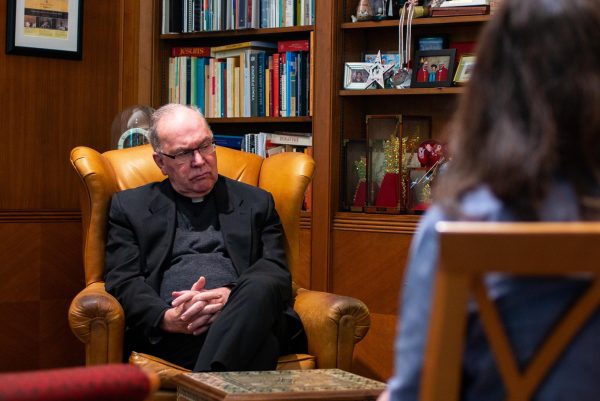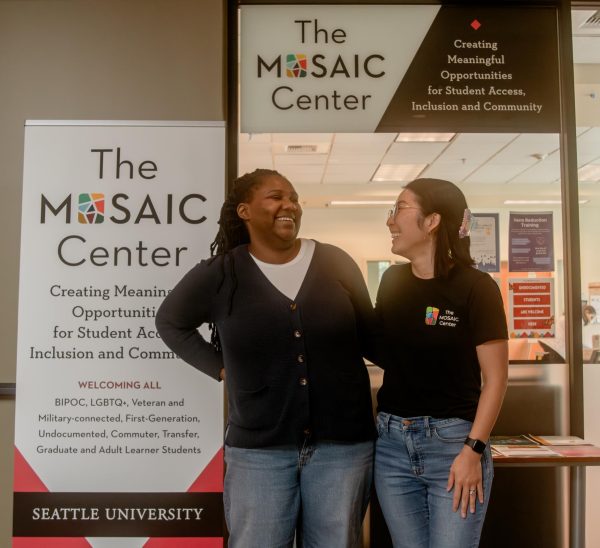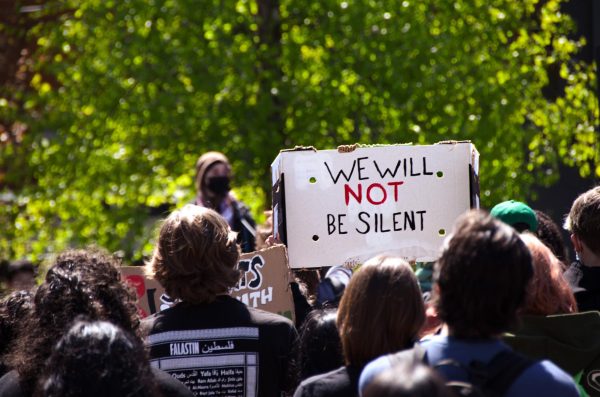Celebrating Lent During COVID-19
The celebration of Lent is one of many events that has been impeded by COVID-19. Since the COVID-19 pandemic began nearly a year ago, the Jesuit community has been forced to find ways to move forward—whether that’s holding Mass online, over Zoom or limiting the number of people that can attend Mass in-person and while socially distanced.
In 2020, the pandemic hit the U.S. during Lent, which typically begins mid-February and lasts until Easter. During Lent, it is common to sacrifice a commodity or a habit, such as social media, television or smoking. However, with little time to adjust to living life remotely, many peoples’ plans and sacrifices for Lent 2020 were dashed.
Third-year Seattle University Nursing student Jacob Castro recalled feeling overwhelmed by the sudden turn of events in 2020, especially as campuses shut down, students returned home and lives were upturned.
“I just didn’t give up anything. There was just so much happening at once, so it was just kind of put in the back of my mind,” Castro said.
Although Lent will be held virtually and socially distanced yet again, this year’s liturgical season will look different from the last. Seattle U President Stephen V. Sundborg, S.J. elaborated on the 2021 Lenten season, noting how things will look and feel more comfortable, despite the pandemic’s lasting effects.
“[Last year] everyone was scrambling, nobody knew how to live. However, this year we are much more settled and used to things now—maybe too used to it,” Sundborg said.
Though it will still be some time before people can gather again in person, the Jesuit community feels more confident and prepared going into Lent this year than last.
“Now that I have this whole virtual thing down, I definitely have the stability to actually practice Lent and follow through. I’m going to try to sacrifice soda this year,” Castro said.
Like many others, the internet and online platforms like Zoom have proved to be essential tools for the Jesuit community. Erin Beary Andersen, Seattle U Associate Campus Minister Director, noted how physical separation has not eliminated the Jesuit experience, but merely changed it.
“Zoom allows us to remember that we are a community even though we are physically separated. It’s important to gather in any way that we can—it’s a completely different way to experience worship and community,” Andersen said.
Tammy Liddel, Seattle U Director of Campus Ministry, elaborated on how the option to gather through Zoom has made Campus Ministry resources and events accessible to a larger number of Seattle U students.
“Some of our students might not have as much freedom due to family or financial obligations to make time for practicing their faith. We’ve always known that but I don’t think we ever got very creative about how to include them,” Liddell said. “So, I think that we may always offer a hybrid version of our programming. We’ve found that it’s become possible for these students to find a little bit of time to go online in between classes or taking care of their kids.”
Castro also reflected on how the convenience of the internet is keeping him in touch with his faith throughout the pandemic.
“When I would forget to schedule Mass at school, I would just go watch Mass on Youtube. It’s easily accessible, and you can watch it anytime, really,” Castro said.
The convenience of online platforms has revolutionized how communities are able to connect with one another. However, there are some downfalls. Tayz Hernandez, a fourth-year psychology and theology double-major and a student campus minister at Seattle U, reflected on how her ability to serve the community has drastically changed in the context of Zoom.
“One of the things I love most about liturgical service is giving back to the community, planning events and being able to see those through. Being remote has taken away that aspect of the Church community,” Hernandez said.
This year, the university held two masses Feb. 17 to commemorate Ash Wednesday, which officially initiates the season of Lent. Typically, eight masses are held throughout the day, but due to COVID-19, that was not possible this year. The services were held at St. Ignatius Chapel and had a limited number of guests who were allowed to attend in observance of social distancing guidelines. Masks were required for the entirety of the service, and instead of the traditional custom, which involves putting ash on the forehead, it was sprinkled over the head in order to avoid physical touch and to adhere to COVID-19 safety measures.
Seattle U, while following health guidelines closely, was able to provide the community and active participants in Lent with preparation materials beforehand. Hernandez touched on the process Seattle U went through to engage with the community before Lent.
“The Tuesday before Ash Wednesday, we distributed self-care baskets that had rosaries with guides, and we had reflection booklets with readings of scriptures for the day, some face masks, candy and silly putty to commemorate the start of Lent,” Hernandez said.
Seattle U Campus Ministry is also holding a variety of events for students of all religious backgrounds to support each other. Students are able to attend daily Masses that the university holds at St. Ignatius Chapel, but they must RSVP to save a spot, as capacity is limited to 10-15 people. Although Mass at St. Ignatius Chapel is typically open to the entire community, only Seattle U students and faculty are currently able to attend at present.
Aside from daily Mass, Seattle U Campus Ministry holds other events, such as Sunday Word and Worship, Lunch on the Couch, Praying the Rosary and campus ministry retreats, which students can register for on ConnectSU. Although student retreats will not be the same as they were in pre-COVID-19 times, Campus Ministry has modified them to be held online over Zoom.
Additionally, students are invited and encouraged to reach out to campus ministry for their personal, spiritual and religious needs.
“We are here for you, whether you are religious, secular or spiritual in terms of your background—we’re here for folks,” Andersen said.
For students seeking emotional, anxiety or grief support, scheduling a Pastoral Care and Conversation appointment with Campus Ministry is a viable option. Students of faith who are looking for guidance to deepen their religious or spiritual journey are also encouraged to schedule a Spiritual Accompaniment appointment.
“It’s a great option because sadly, there can be a little bit of a stigma with seeking counseling, so this is a nice way to have a safe conversation. We are confidential resources. We can be an intermediate step for someone who may be thinking about counseling. We really offer a wide range of support for students,” Andersen added.
In the spirit of Lent, students of all faith backgrounds are also encouraged to participate in the Rice Bowl, which is a charity event held by Catholic Relief Services. The funds donated to the charity go towards supporting families in need from all around the world. An important part of Lent is practicing almsgiving and helping those in need, and the Rice Bowl is a great opportunity to do so. Liddell elaborated on the importance of participation in times like the present.
“Your whole self should be involved in this, not just one aspect,” Liddell said. “I encourage students of faith to really find ways to partake in Lent that relates to every aspect of their life. My hope for all Seattle U students, regardless of their background, is to be more mindful and reflective—whether that’s out of a Christian motivation or just a desire to not only be aware of yourself, but who you are and the world around you.”
Another key element of Lent is the Sacrament of Reconciliation, which is an important time for people in the church to reflect on how they can transform their lives to better their relationships with God and the people around them. Although daily Mass is currently being offered at St. Ignatius Chapel, there is also a question of whether Reconciliation can be offered in-person.
JoAnn Lopez, Seattle U’s Campus Minister for Liturgy, attested to the difficulty of determining the logistics of such important events within the Jesuit community.
“We’re still awaiting approval to offer Reconciliation on campus given campus COVID-19 protocols,” Lopez said.
Plans for Reconciliation will have to be determined by the constantly evolving COVID-19 guidelines, so it is difficult to predetermine which events will be permitted.
“We are also sharing with students that they can receive the Sacrament of Reconciliation at St. James Cathedral on Saturdays and Wednesdays,” Lopez added.
In regards to Easter weekend celebrations, it still looks to be too early to set in stone community plans and guidelines.
“I’m not sure if we will have enough students, faculty and staff to attend, but we will at least have Easter Sunday Morning Mass,” Liddell said.
Ultimately, it is the following weeks that will determine the ways in which the liturgical year will be celebrated within the Jesuit community at Seattle U. The one thing that remains clear, however, is that 2021 will be celebrated quite differently from 2020 and moving forward.
“We don’t need to sacrifice anything this year. People have already been forced to sacrifice countless things because of the pandemic. I think that this year, we just need to learn the gift that has been given to us, whether that’s patience, humility, care or generosity,” Sundborg said.











